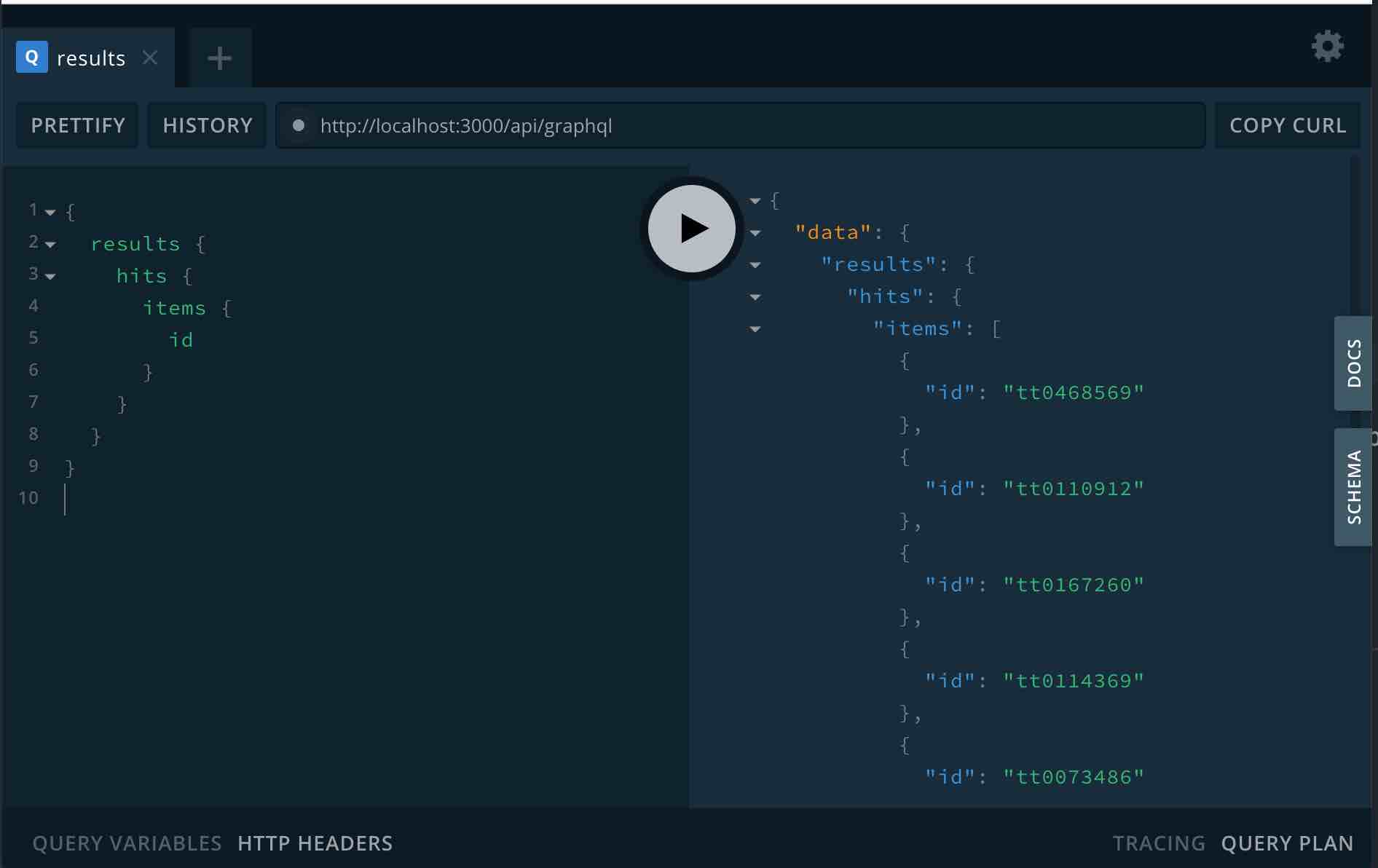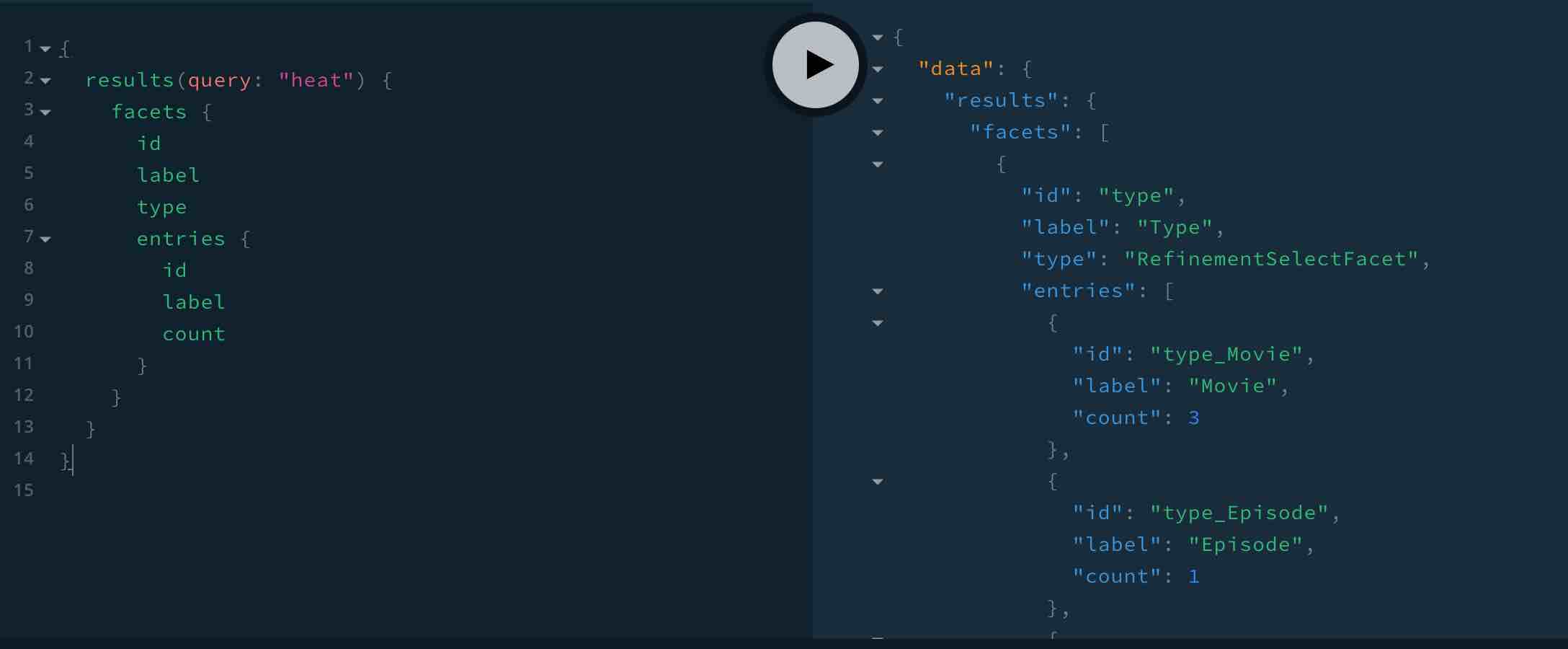API Setup
Setting up Elasticsearch & Indexing
See Setting up Elasticsearch & Indexing Guide to setup Elasticsearch and index the data corpus to be searched by searchkit.
Setup Apollo Server
First step is to setup Apollo Server within our app. We are using Next & Apollo Server Micro where we will use API routes for our app.
First install apollo-server-micro
yarn add apollo-server-micro
then create a graphql.js file in the pages/api folder
import {ApolloServer, gql} from 'apollo-server-micro';
export const config = {
api: {
bodyParser: false,
},
};
const typeDefs = [
gql`
type Query {
root: String
}
type Mutation {
root: String
}
`,
];
const server = new ApolloServer({
typeDefs,
resolvers: {},
introspection: true,
playground: true,
context: {},
});
export default server.createHandler({path: '/api/graphql'});
Once saved and you have started the app via yarn start, you should be able to access the graphql playground locally.
Dont use Next?
Apollo Docs provides how to add Apollo Server to any Node based app such as express and AWS Lambda should you wish not to use Next.
Add Searchkit Schema
Install the NPM module for searchkit
yarn add @searchkit/schema
then add searchkit SDL schema and resolvers to graphql server. in this example, we are passing Searchkit's SDL Apollo Server.
import { ApolloServer, gql } from 'apollo-server-micro'
import {
MultiMatchQuery,
SearchkitSchema
} from '@searchkit/schema'
const searchkitConfig = {
host: 'http://localhost:9200',
index: 'my_index',
connectionOptions: {
apiKey: "ddfvvvdv", // Optional. Elasticsearch apiKey
headers: {
"x-custom-header": "exampleValue" // any custom headers required for the request.
}
}
hits: {
fields: []
},
query: new MultiMatchQuery({ fields: [] }),
facets: []
}
// Returns SDL + Resolvers for searchkit, based on the Searchkit config
const { typeDefs, withSearchkitResolvers, context } = SearchkitSchema({
config: searchkitConfig, // searchkit configuration
typeName: 'ResultSet', // type name for Searchkit Root
hitTypeName: 'ResultHit', // type name for each search result
addToQueryType: true // When true, adds a field called results to Query type
})
export const config = {
api: {
bodyParser: false
}
}
const server = new ApolloServer({
typeDefs: [
gql`
type Query {
root: String
}
type HitFields {
root: String
}
# Type name should match the hit typename
type ResultHit implements SKHit {
id: ID!
fields: HitFields
}
`, ...typeDefs
],
resolvers: withSearchkitResolvers({}),
introspection: true,
playground: true,
context: {
...context
}
})
export default server.createHandler({ path: '/api/graphql' })
Make sure you replace the host, index. This will setup a basic searchkit API and visiting the API playground, you should be able to do a simple query to make sure its connected to your elasticsearch instance correctly.
{
results {
hits {
items {
# 'ResultHit' should match the hitTypename and type you implemented in SDL
... on ResultHit {
id
}
}
}
}
}

Setup Hit Values
Next you want to configure the fields that come back for each field. For our IMDB search app, we want to show the title, writers, actors, plot and poster for each hit. First locate the HitFields type definition and add the fields that you want to display per hit item.
You will need to define the type per field. See GraphQL types to learn more.
type HitFields {
title: String
writers: [String]
actors: [String]
plot: String
poster: String
}
Now update your query in graphql playground to include these hit fields
{
results {
hits {
items {
... on ResultHit {
id
fields {
title
writers
actors
plot
poster
}
}
}
}
}
}
Configuring Query
Next you want to configure the fields to search on when you provide a text query. To do this, locate the MultiMatchQuery({ fields: [] }) and pass in the elasticsearch fields that you want to be queried on.
For Searchkit Demo, we want to search the following fields: actors, writers, title and plot. We want title to be the most important field so we will boost its importance by 4. The configuration for this would be
new MultiMatchQuery({ fields: ['actors', 'writers', 'title^4', 'plot'] })
Once this has been setup, you should be able to use the query param in the GQL query.
{
results(query: "heat") {
hits {
items {
... on ResultHit {
id
fields {
title
}
}
}
}
}
}
Configuring Facets
Next we want to setup facets for our search. Facets are configured within the searchkit configuration.
const searchkitConfig = {
host: 'http://localhost:9200',
index: 'my_index',
query: new MultiMatchQuery({fields: []}),
facets: [
new RefinementSelectFacet({
field: 'type.raw',
identifier: 'type',
label: 'Type',
}),
new RefinementSelectFacet({
field: 'writers.raw',
identifier: 'writers',
label: 'Writers',
}),
new RefinementSelectFacet({
field: 'actors.raw',
identifier: 'actors',
label: 'Actors',
}),
],
};
Facets Response
Once configured, API will return all facets values for fields that have aggregations.
{
results(query: "heat") {
facets {
identifier
label
type
entries {
label
count
}
}
}
}
See below the response in playground

Adding Filters
When the user chooses to filter by movies, you can add the filter like so
{
results(query: "heat", filters: [{identifier: "type", value: "Movie"}]) {
facets {
identifier
label
type
entries {
label
count
}
}
}
}
Searchkit will query elasticsearch to show only hit + facet results that have a type field value of movie.
Modify Elasticsearch request body
If you need to modify the request body before sending it to Elasticsearch, eg. to add min_score, you can add a postProcessRequest function to your schema config.
Every search request will pass through this function, containing the full body, and expecting a full request body back.
const searchkitConfig = {
host: 'http://localhost:9200',
index: 'my_index',
hits: {
fields: [],
},
query: new MultiMatchQuery({fields: []}),
postProcessRequest: (body) => {
return {...body, min_score: 10};
},
};